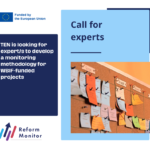Key elements
The strategy entitled ” A Credible Enlargement Perspective for and Enhanced EU Engagement with the Western Balkans“, adopted today by the European Commission, has three key points: 1) sending a political message that enlargement is still on the EU agenda; 2) an attempt to increase the credibility of the region’s prospects for membership in the EU by giving an indicative date for countries most advanced in the process; and 3) systematizing the many parallel initiatives and the outcome of the Berlin process within the enlargement process.

Firstly, the Strategy emphasizes that the “solid prospect of merit-based membership of the Western Balkans” is in line with the EU’s political, security and economic interests and is a geostrategic investment. At the same time, the enlargement policy is presented as part of a larger strategy for strengthening the Union by 2025. With this, the Commission is trying to influence EU citizens and their opinion on enlargement, which is a relatively refreshing practice, in comparison to the one witnessed hitherto, of highlighting the lack of support for enlargement in EU member states.
Secondly, by separating Montenegro and Serbia as the countries most advanced in membership negotiations and indicating a potential date for their membership, the Commission is attempting to restore the credibility of the enlargement process. However, on several occasions, the Commission states that these dates are a realistic prospect, not a deadline in themselves.
Thirdly, the Commission highlights six initiatives for increased engagement with all countries in the region, which largely systematize the multiplicity of parallel processes that have begun in the past few years, while EU enlargement was in the background.[1] The areas covered are no surprise: the rule of law, security and migration, socio-economic development, connectivity, digital agenda, reconciliation and good neighborly relations. Regarding the first item, action plans for Chapter 23 – Justice and Fundamental Rights and Chapter 24 – Justice, Freedom and Security were announced in order to ensure the sustainability of the rule of law reforms.
Where is the Republic of Macedonia?
Serbia and Montenegro hold the first place in the Strategy among the candidates in the accession process, and they have been given an indicative accession framework. However, the Strategy leaves room for other countries to progress at the same or faster pace. The Republic of Macedonia is mentioned twice in the entire document, in the context that “the Commission is ready to recommend the start of negotiations on the basis of fulfilled conditions” – in the same package with Albania. What follows is the adoption of the enlargement package in April 2018. It is our chance to give the Commission arguments for recommending the start of negotiations and make use of the Republic of Macedonia’s advantages, such as its alignment with European acquis. In addition to emphasizing that all future EU members must resolve bilateral disputes, the Strategy does not directly address the name dispute.
In addition, the Republic of Macedonia was indirectly mentioned in terms of compliance with the EU’s foreign policy. Mogherini emphasized that at present, only Montenegro and Albania are fully aligned with the Union in terms of their foreign policy, primarily referring to sanctions against Russia. Given that “EU membership is a choice”, the Strategy emphasizes that candidate countries should protect the common values of the Union in which they want to be members.
“Warming up” for the new financial prospect?
With this Strategy, the European Union does not provide more money to support the region, but reallocates the already existing funds to support the reform priorities in accordance with the Strategy. However, the Commission announces that in order to realize prospects and promises, as well as direct support for the quality and sustainability of reforms, it will be necessary to provide more funds with the new Financial Prospect, which will cover the 2021-2027 period. In light of previous experiences, bilateral assistance will be conditioned by the fulfillment of the objectives of the Strategy and good-neighborly relations.
[1] The Berlin process, with its political and economic dimension, and similar initiatives, such as the fundamental first, were put in place to prepare countries for membership.





